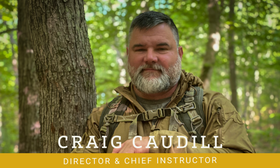
The 7 Core Survival Skills That Could Save Your Life
Whether you’re deep in the backcountry or caught in a natural disaster, your gear won’t save you—your skills will. At Nature Reliance School, we’ve spent years teaching real people how to stay alive and thrive when conditions get tough. The truth is, you don’t need to know everything. You just need to master the essential survival skills—the ones that matter most.
Here are 7 basic survival skills that could save your life, whether you’re miles off the grid or facing a crisis close to home. You can also read my piece on The Survival Rule of Threes over on the Tuff Possum Gear website.
1. Shelter Building
The human body loses heat fast. If you're exposed to wind, rain, or snow without protection, hypothermia can set in within hours, sometimes faster.
Learning how to construct a quick shelter from garbage bag, natural materials or a tarp is a non-negotiable skill.
Helpful Tip: Practice all three. Get a 55 Gallon Drum Garbage bag and use it as an impromptu rain jacket, practice your knots and tarp setups, go to the woods and find natural shelters or make them from natural materials.
2. Fire Starting
Fire warms you, dries your clothes, cooks your food, and signals for help. But it’s also one of the hardest things to do under pressure. Cold, wet conditions can shut down even seasoned outdoors folks if they’re not prepared.
We recommend always having a lighter in your pocket, a lighter in your backpack as backup and a ferro rod and dry tinder in you kit as well, but more importantly, knowing how to use them.
Pro Move: Practice lighting fires in the rain with soaked wood. That’s when it counts.
3. Water Purification
You can survive three weeks without food, but you can only function optimally as a human without water for a few short days. In the wild, even clean-looking water sources can carry parasites and bacteria that’ll put you down fast.
Learn to filter, boil, or chemically treat water in the field. Know the difference between the filtering and purifying and why it is important.
Essential Gear: Carry a backup purification method. You might not be able to get a fire to boil your water. Filters can break, freeze, or get clogged. Purification tablets dont. So carry both.
4. Land Navigation
Getting lost is easier than most people think. Cell phones die, GPS apps crash, and trail markers disappear. Knowing how to read a map and use a compass can mean the difference between getting home… or not.
At Nature Reliance School, we teach land nav as a thinking skill, not just a gear-dependent one.
Core Concept: Understand terrain association, natural navigation, and handrail features before ever touching a compass.
5. First Aid
Cuts, breaks, burns, bites, you name it, we’ve seen it. In a survival situation, there’s no 911. Your ability to stop bleeding, splint a limb, or reduce swelling can literally save a life, maybe your own.
You don’t need to be a medic. But you do need to know what to do in the first 15 minutes of a crisis.
Reality Check: Most first aid kits are just bandaids and hope. Build your own with the stuff that really works.
6. Situational Awareness
This might be the most underestimated survival skill on the list. Whether it’s spotting animal tracks, hearing an approaching threat, or noticing an incoming storm, awareness keeps you alive.
We call it “reading the landscape.” And it’s a skill you can develop every time you walk into the woods or down your street.
Pro Tip: Stop multitasking outdoors. Start noticing more. Nature leaves clues. There is a huge difference in seeing things rather than just looking.
7. Mindset and Decision Making
Panic kills. The best survivalists aren’t the ones with the most gear, they’re the ones who stay calm, think clearly, and adapt under stress.
That’s why every course we teach starts with mindset. You don’t rise to the occasion, you fall to your level of training.
Train This: When things go wrong, breathe. Make a plan. Work the problem.
Final Thoughts: Don’t Just Read - Train
Reading about these basic survival skills is a great start. But they won’t help you unless you’ve practiced them under pressure. At Nature Reliance School, we don’t just teach, you do. Our in-person and online training programs are built to make these skills second nature.
Want to become more self-reliant?
Check out our online membership or join us for an upcoming class—and build the confidence that only comes from real-world training.
Suggested Internal Links:


Leave a comment